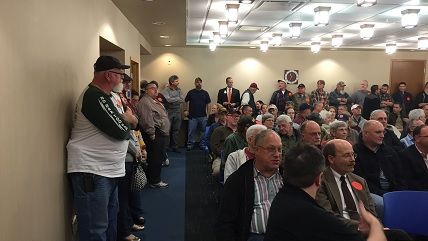Vindication For Virginia Gun Rights Group
Katie Couric admits to deceptive edit, but anti-gun extremist director still standing by it

Once in a while the little guys win—as the Virginia Citizens Defense League did recently. The gun-rights group has achieved a measure of vindication after a Katie Couric documentary about guns tried to make it look bad.
Biased coverage of controversial topics, including guns and gun control, shows up in all sorts of ways. Usually they're fairly subtle. Mainstream news organizations routinely refer to "the gun lobby," for instance, but almost never to "the abortion lobby"—even though both gun-rights groups and abortion-rights groups maintain powerful lobbying arms in Washington and state capitals. But "lobby" carries perjorative overtones, so it gets applied only to gun advocates.
That is almost certainly unintentional. Most news organizations try to be even-handed, and often don't realize when they fall short.
But there was nothing unintentional about what Couric and Stephanie Soechtig, the director of Under the Gun, did to the VCDL. To the contrary, their behavior was deliberately mendacious.
In the film, Couric asks a group of members of the VCDL, "If there are no background checks for gun purchasers, how do you prevent felons or terrorists from walking into, say, a licensed gun dealer and purchasing a gun?"
What follows is several seconds of awkward silence. The camera focuses on the faces of the gun-rights supporters, who cast their eyes downward as, it appears, the folly of their own position sinks in. Ominous music swells.
Except that isn't how the interview went. Raw audio provided by VCDL president Philip Van Cleave shows that the interviewees answered the question immediately. The first response, in fact, took a page right out of Gov. Terry McAuliffe's book: "Well, one, if you're not in jail, you should still have your basic rights. . . . If you've done your time, you should have your rights." As McAuliffe himself put it regarding his order to restore felons' voting rights, once you have served your time, "you have paid the price. You are done with the legal system. You are back in society."
Another VCDL member points out that "we do have statutes both at the federal and state level that prohibit classes of people from being in possession of firearms. If you're under 18 in Virginia, you can't walk around with a gun. If you're an illegal immigrant, if you're a convicted felon, if you've been adjudicated insane—these things are already illegal. So what we're really asking about is a question of prior restraint. How can we prevent future crime by identifying bad guys before they do anything bad? And the simple answer is, you can't. And particularly under the legal system we have in the United States. There are a lot of Supreme Court opinions that say: No, prior restraint is something the government does not have the authority to do. Until there is an overt act that says, 'that's a bad guy,' then you can't punish him."
You can agree or disagree with that answer, but it's an intelligent response to a good question. Yet the documentary omits it to make the VCDLers look like idiots.
When first called out for the deception, Couric and Soechtig defended it. "My intention was to provide a pause for the viewer to have a moment to consider this important question," Soechtig said. Couric pronounced herself "very proud" of the film.
Eventually, Couric summoned the grace to climb down. "I take responsibility for a decision that misrepresented an exchange I had with members of the Virginia Citizens Defense League," she said last week. "I regret that those eight seconds were misleading and that I did not raise my initial concerns (about them) more vigorously."
Soechtig, on the other hand, remained defiant. She claimed that documentaries have "a different standard than the nightly news has. When you're making a film like this, the goal is to get people to come to theaters to watch your film." And anyway, if she had wanted to make the VCDL look bad, "I would have focused exclusively on their radical ideology." She laments the way a "noisy fringe" has "been really successful in preventing our legislators from passing any meaningful legislation on this issue."
This is hardly the only example of manipulative editing, of course. A year ago the country was consumed with the sting videos purporting to expose Planned Parenthood's criminal trade in fetal tissue. Those videos likewise turned out to be, as countless news organs put it, "heavily" and "deceptively edited." The filmmakers ended up being the ones indicted. A couple of decades ago NBC apologized for a Dateline segment in which it rigged GM trucks with incendiary devices to make sure they exploded on camera. Michael Moore's polemics have necessitated an entire industry to track his various deceptions, manipulations, and misrepresentations.
Couric herself has a history of hostility toward the rights of what she once called "Second Amendment fundamentalist zealots." In sharp contrast—and even after this episode—supporters of the Second Amendment still defend her rights under the First.


Show Comments (113)